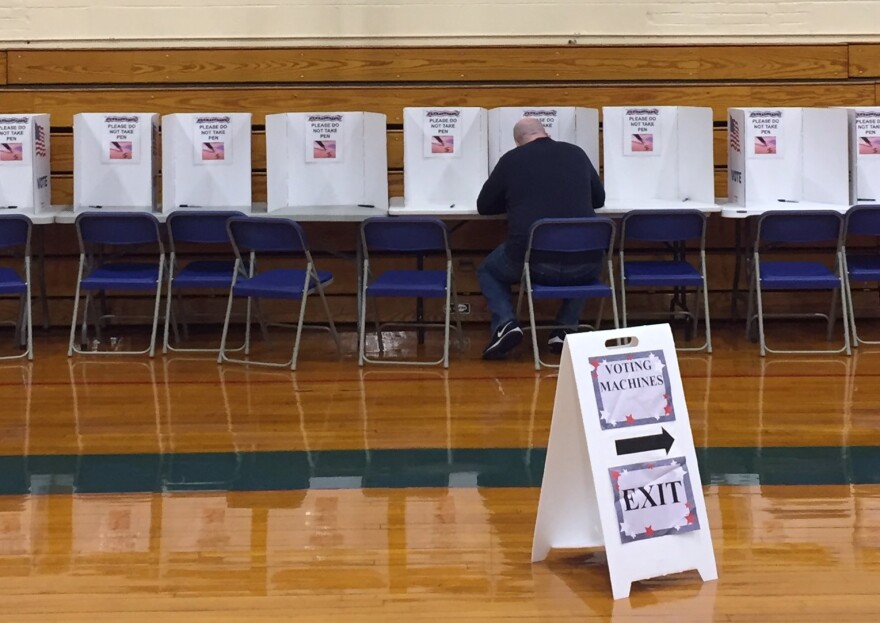Almost all of the Democrats running for president will appear at the state party's convention in Manchester this weekend. But long before many of the candidates started showing up at conventions, cookouts and coffee shops, they’ve been steering money toward local Democratic committees and campaigns here in New Hampshire.
Using fundraising data from the Federal Election Commission, NHPR tallied up more than $1.1 million in local campaign money linked to Democratic presidential hopefuls since 2016. (Scroll down for details on how we came up with this number.)
Here’s more on where that money came from — and how it was spent.
While thousands of dollars went to local committees and campaigns, most of the money Democratic presidential hopefuls have spent on New Hampshire since 2016 has gone to the state Democratic Party.
The New Hampshire Democratic Party has received more than $850,000 from presidential hopefuls and their affiliate PACs since the last presidential election. Of that total, candidates have spent at least $750,000 to buy access to the state party’s voter file.

The state party charges presidential campaigns $100,000 apiece for access to its voter database, which includes the information found in New Hampshire’s statewide voter checklist combined with other information the party collects to help them target local voters.
NHDP Spokeswoman Holly Shulman declined to speak in detail about the party’s voter file, citing concerns about sharing inside information about their political strategy, except to say that “Democrats in New Hampshire have a record of running a very sophisticated, data-driven campaign operation.”
Shulman said the state party is pleased to see presidential hopefuls engaging with campaigns of all levels in New Hampshire — including not just fundraising but also canvassing for local races. And she said the contributions that have come in directly to the state party will also go back into local races.
“Every single dollar we get goes to electing Democratic candidates up and down the ticket, from cemetery committee-member to road agent to mayors to State House to Congress to U.S. Senate to president of the United States,” Shulman said.
Would-be 2020 candidates gave thousands to Congressional and legislative candidates, especially during the 2018 midterms.
The most prolific donor among the 2020 presidential hopefuls is actually no longer in the presidential race. Massachusetts Congressman Seth Moulton sent more than $116,000 to New Hampshire campaigns in 2018.
Most of that money came from Moulton’s Serve America PAC, Serve America Victory Fund and Serve America Women’s Victory Fund — which were set up to help elect more veterans to public office. Most of Moulton’s money in New Hampshire went to veteran and former First District Congressional candidate Maura Sullivan, but he also gave thousands of dollars to the Congressional campaign of Chris Pappas, several legislative candidates and the state party.
Maryland Congressman John Delaney also spent heavily on New Hampshire campaigns leading up to the midterms, contributing more than $29,000 in 2018 and $5,000 the year before. In addition to donations to the New Hampshire Democratic Party, Delaney gave $10,000 to the Manchester Democrats, $7,500 to the Rockingham County Democrats, $4,000 to the Nashua Democratic City Committee and $5,000 to the New Hampshire Young Democrats.
PACs were key to presidential hopefuls' fundraising power in local races.
The “PAC for a Level Playing Field,” “Purpose PAC,” and “America 2.0 PAC” might not mean much to the average voter, but these and other groups helped pave the way for now-presidential candidates to connect with New Hampshire Democrats leading up to the 2020 primary.
Massachusetts Sen. Elizabeth Warren spread $19,000 from her “PAC for a Level Playing Field” across New Hampshire campaigns in 2017 and 2018 — including $8,000 to campaigns supporting Democrats running for the State House. Warren gave the New Hampshire Democratic Party $10,000 from her Senate campaign account in 2018.
New Jersey Sen. Cory Booker’s “Purpose PAC” also contributed $15,000 to Congresswoman Annie Kuster, Pappas and the state Democratic Party.
Ohio Congressman Tim Ryan’s “America 2.0 PAC” gave $1,000 to Senate President Donna Soucy’s campaign in 2017, plus another $4,000 to Kuster in 2017 and 2018. So far this year, the PAC’s given another $1,000 to the New Hampshire Young Democrats, $1,000 to Manchester Mayor Joyce Craig and $500 to Senate Majority Leader Dan Feltes, who recently launched a gubernatorial bid.
And while New York Sen. Kirsten Gillibrand is no longer in the presidential race, her “Off the Sidelines PAC” — geared toward supporting female candidates — contributed $15,000 to Kuster and Congressional candidate Maura Sullivan leading up to the 2018 midterms.
How did we calculate the numbers above?
NHPR used the FEC’s campaign finance database to pull records for any payments made from a federal campaign to any entity with a New Hampshire address since the last presidential election.
We then narrowed those records to look at spending linked directly to Democrats who launched 2020 presidential bids, including those who have recently dropped out. In addition to looking at contributions from traditional campaign committees — like a U.S. senator or Congressperson’s re-election campaign — we also looked at payments made by leadership PACs and joint fundraising committees.
While we tried to be comprehensive in our analysis, the data we compiled doesn’t fully capture all of the money Democratic presidential hopefuls have brought to New Hampshire campaigns to-date.
Many of committees have only reported their spending for two fundraising quarters this year, so many payments made since July are not included here. Also, the data only accounts for direct spending from federal campaign accounts — so that would not include contributions made from state-level campaign accounts or from individual donors who were encouraged by presidential candidates to donate to New Hampshire races.
That said, the data still provides insight into the kind of financial impact the large field of presidential candidates is having on local races.








